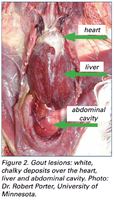Hi all, thanks as always for the help.
I have a mixed flock, got them all about 20 weeks ago. Rhode Island’s, caramel queens and Barred Rock. Total of 22 birds.
All hens, except for 3 barred rock roosters.
All looked healthy in the morning, when I went out 8hrs later, one of the barred rock roosters was found dead. No ones been acting strangely.
I only have a few minutes and opened him up....(YES, definately should have taken pictures).
Crop was full (in a healthy way), no works anywhere I could see (trachea was clear). The 2 abnormalities I noted:
1) the underside of one lobe of the liver had whitish material “dots”, that I could almost rub away. They didn’t look like big nasty tumors/cysts. It was almost like a fibrous material. It was somewhat subtle. The anterior surface of the liver looked normal, it was just on the underside of one of the lobes.
2) same stuff on the outside of the heart (the pericardium). Heart size seeemed appropriate). When I opened the pericardium I could not tell if there was whiteness on the inside of the heart as well.
I have opened up/processed perhaps 100 birds over last 2-3 yrs (I know, not a lot compared to many of you), but any thoughts which could cause sudden death in this situation.
I know, nxt time I’ll take pictures!
Thanks!
I have a mixed flock, got them all about 20 weeks ago. Rhode Island’s, caramel queens and Barred Rock. Total of 22 birds.
All hens, except for 3 barred rock roosters.
All looked healthy in the morning, when I went out 8hrs later, one of the barred rock roosters was found dead. No ones been acting strangely.
I only have a few minutes and opened him up....(YES, definately should have taken pictures).
Crop was full (in a healthy way), no works anywhere I could see (trachea was clear). The 2 abnormalities I noted:
1) the underside of one lobe of the liver had whitish material “dots”, that I could almost rub away. They didn’t look like big nasty tumors/cysts. It was almost like a fibrous material. It was somewhat subtle. The anterior surface of the liver looked normal, it was just on the underside of one of the lobes.
2) same stuff on the outside of the heart (the pericardium). Heart size seeemed appropriate). When I opened the pericardium I could not tell if there was whiteness on the inside of the heart as well.
I have opened up/processed perhaps 100 birds over last 2-3 yrs (I know, not a lot compared to many of you), but any thoughts which could cause sudden death in this situation.
I know, nxt time I’ll take pictures!
Thanks!





